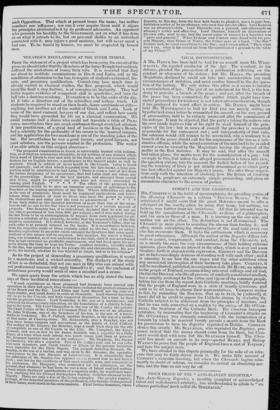LEGAL INCONSISTENCIES.
A MR. DANCE has been held to bail for an assault upon Mr. WEST- MACOTT, the reputed conductor of the Age. The assailant, in his defence, pleaded the provocation of a publication reflecting on the conduct or character of his sisters ; but Mr. HALLS, the presiding Magistrate, declared he could not take into consideration any such circumstances of irritation, and must confine himself to the dry ques- tion of the battery. We only notice this affair as it seems to involve a contradiction of law. The gist of an indictment for libel, is the ten- dency to provoke a breach of the peace ; and yet, after the breach of the peace has been committed, the matter which might have war- ranted proceedings for tendency is not taken into consideration, though it has produced its worst effect in action. Mr. DANCE might have held Mr. 'WESTIVACOTT to bail for libel (we are merely stating an hypothetical case) before he committed the assault, on the very ground of provocation, held to be entirely irrelevant after the commission of the outrage. It may be objected, that the party's taking the redress into his own hands deprives him of his right to avail himself of the prin- ciples of the law : but in cases of assault the provoker is accounted responsible for the consequent riot ; and independently of that rule, the solecism would still remain to be reconciled, why a tendency to a breach of the peace should call for the cognizance of the law as a sub- stantive offence, while the actual causation of the mischief to be avoided cannot even be viewed by the Magistrate having the disposal of the matter in the first instance. It may be said, that after the assault had taken place, the merits were for the consideration of a jury : but we reply to this, that unless the alleged provocation is taken into view, the question (taking into the account the foolish f fiction of law regard- ing the tendency of libel) is not strictly determined as to which party has first offended against his Majesty's peace. We otter these sugges- tions only with the intention of showing how the fiction of tendency referred to, perplexes an extremely simple proceeding, and gives an anomalous character to the course of justice.


















 Previous page
Previous page